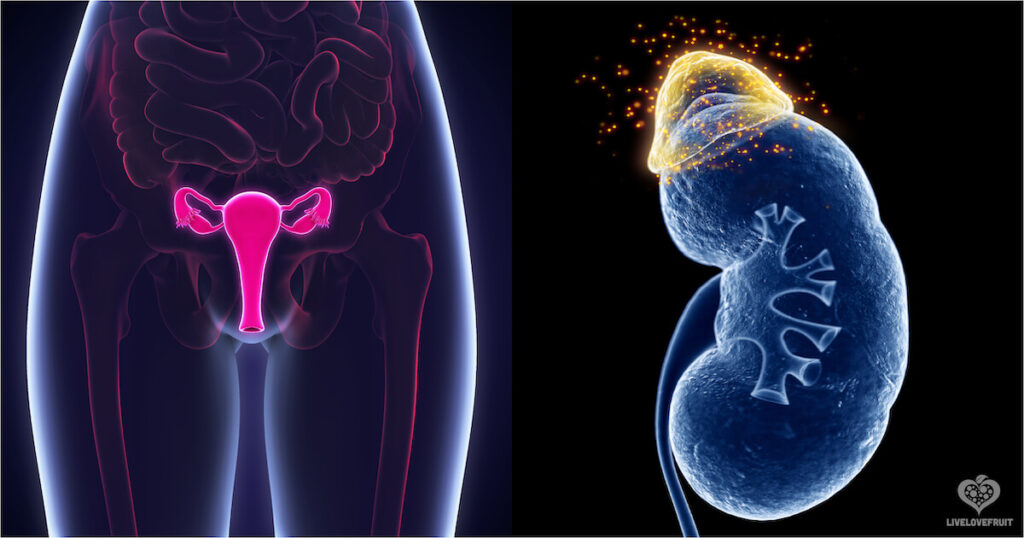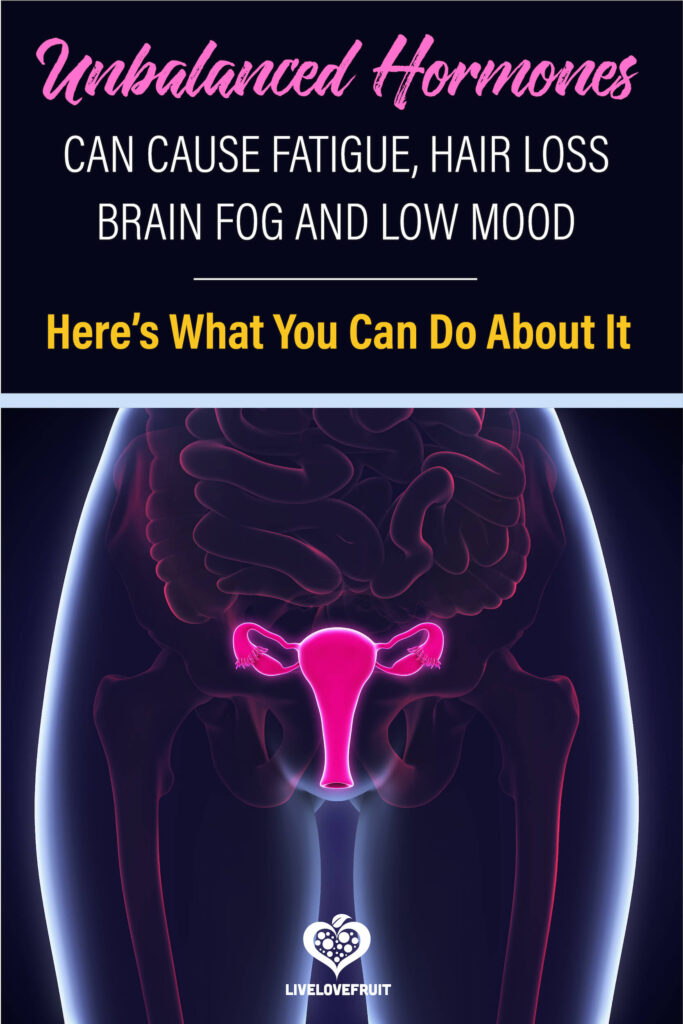
Your hormones are the reason why your arms are the same length, why your entire body changed at puberty and why you can turn fuel into food.
Hormones are extremely important chemical messengers that influence the way we think, breathe, eat, and sleep. They also change the way we look, feel and function.
When they fall out of balance, many functions in our body suffer as a result. We may feel more lethargic and moody, put on extra weight, or our hair might start falling out.
Whatever the reason, there are natural ways to balance your hormones that don’t require prescription medications. Sometimes all it takes are a few lifestyle changes.
But first, let’s talk a little about the endocrine system.
What Is the Endocrine System?
Your hormones are tiny chemical messengers that are secreted directly into the blood by the glands that produce and store them. These glands make up what is known as the endocrine system.
Your endocrine system and hormones work together to maintain a constant environment (i.e,, homeostasis) within the body.
In response to specific stimuli, hormones are released from these glands and into the bloodstream. From here, they target specific tissues or cells by binding to receptors that are located either on the cell surface or inside the cell.
As the hormones attach to their receptors, a cascade of biochemical reactions is set off in the target cell which modifies its function or activity.
The glands that make up the endocrine system include the hypothalamus, pituitary gland, adrenal glands, gonads, (i.e., testes and ovaries), thyroid gland, parathyroid glands, and pancreas (1✓)✓ Trusted ResourcePubMed CentralHighly respected database from the National Institutes of HealthRead source.
The pituitary gland, otherwise known as the “master gland,” controls the activity of most other hormone-secreting glands. It is responsible for sending information from your brain to other glands in your body.
The pituitary gland is made up of two different tissue types:
- The anterior pituitary gland that synthesizes and releases classic hormones
- The posterior pituitary gland that secretes neurohormones that are made in the hypothalamus
The anterior pituitary gland secretes five hormones: leutinizing hormone (LH), follice-stimulating hormone (FSH), thyroid-stimulating hormone (TSH), growth hormone (GH) and prolactin. LH and FSH stimulate the production of sex hormones, TSH stimulates the production of thyroid hormones, GH helps aid proper growth and development and prolactin stimulates milk production after childbirth.
The posterior pituitary gland doesn’t produce hormones on its own; instead, it stores two hormones – vasopressin and oxytocin – that are produced by neurons in the hypothalamus and then released into the bloodstream.
There are two major groups of hormones that circulate in the bloodstream: peptides (proteins) and steroid hormones. Amino acid-based hormones can be divided into three categories: proteins, peptides, and amines.
Here is a breakdown of these hormones:
- Protein Hormones: hormones that consist of long chains of amino acids (polypeptides) and include GH and FSH. Because of their chemical structure, protein hormones cannot enter cells. Instead, they interact with receptors on the cell surface.
- Peptide Hormones: hormones that consist of short-chain amino acids and include vasopressin and oxytocin.
- Amine Hormones: hormones that are synthesized from the amino acids tryptophan (like melatonin) or tyrosine (like thyroid hormones and dopamine).
- Steroid Hormones: hormones that are derived from cholesterol like testosterone, estrogen, and cortisol.
In order to achieve homeostasis within the body, hormone production and secretion must be tightly controlled. As a result, the body regulates all of its functions via several different hormones that control each other instead of one singular hormone (2✓)✓ Trusted ResourcePubMed CentralHighly respected database from the National Institutes of HealthRead source.
So as you can imagine, when just one of these hormones is even slightly imbalanced, many health problems can unfold. Some so extreme that your sleep, metabolism, hunger, growth, and sexual development can all be impacted.
What Causes Hormonal Imbalance?
Hormonal imbalance can be caused by a variety of different factors. Some of these factors may be environmental, genetic or
Our hormones are primarily controlled by two separate areas of the brain: the hypothalamus and the pituitary gland. These areas of the brain receive feedback about how much sleep we get, what our diet is like, environmental toxin exposure, stress levels and so much more.
This system is extremely sensitive, and as our body fights to protect itself from these various factors, our hormones can become easily dysregulated.
Some major contributors to hormonal imbalance include:
- Stress (physical and emotional) and not enough rest
- Being overweight or obese
- High levels of chronic inflammation
- Genetics
- Steroids or other medications
- Thyroid dysfunction (hypothyroid or hyperthyroid)
- Gut issues or food allergies
- Toxicity – the endocrine system is particularly sensitive to endocrine-disrupting chemicals (hence the name), which many of us come into contact with in our day-to-day life
When your hormones become unbalanced, there will be many different signs and symptoms your body will signal to you as a cry for help.
Symptoms of Hormone Imbalance
When your hormones are out of balance, some of the symptoms will be subtle, and some will be obvious.
Here are a few key signs that something is off with your hormone health:
- Unexplained weight gain or weight loss
- Chronic fatigue
- Low libido
- Irregular periods
- Hair loss/hair thinning
- Low mood, anxiety, or depression
- Brain fog
- Headaches
- Hot flashes/night sweats
- Infertility
- Insomnia
- Digestive issues
Certain conditions may also be associated with the above symptoms which may indicate deeper underlying problems. These conditions might include things like:
- Estrogen Dominance: irregular periods, weight gain, fibroids, changes in sleep patterns
- Hypothyroidism: tiredness, weight gain, constipation, muscle aches and weakness, depression, sensitivity to cold
- Hyperthyroidism: nervousness, anxiety, irritability, tiredness, weakness, difficulty sleeping, sensitivity to heat
- Polycystic Ovarian Syndrome (PCOS): infertility, acne, excess body hair, weight gain
- Diabetes: nerve damage (neuropathy), fatigue, dry mouth, skin issues, blurry vision
- Adrenal Fatigue: fatigue (especially upon waking), poor stress response and mood regulation, anxiety, depression, muscle aches and pains
- Low Estrogen: painful sex, low sex drive, mood swings, menstrual irregularity
- Low Testosterone: erectile dysfunction, hair loss, low sex drive, loss of muscle mass, weight gain, mood issues
- Metabolic Syndrome: large waist, fatigue, inability to focus, browning of folds of skin around the neck
- Endometriosis: abnormally painful periods, abnormal or heavy menstrual flow, infertility, painful sex
- Menopause or Perimenopause: hot flashes, night sweats, mood changes, vaginal dryness
Thankfully, you can optimize the health of your hormones and find relief from your symptoms by following a few key steps.
10 Natural Ways to Balance Your Hormones
Given the importance of our hormones and how much they impact our body and lives, utilizing the steps below – if you haven’t already – would be wise.
Let’s start with the first and most crucial – stress management.
1. Keep Stress Minimal
Stress is one of the biggest factors that impact hormonal health. Dealing with chronic stress will cause spikes and dips in several hormones like cortisol, epinephrine, vasopressin, thyroid hormones, prolactin, and growth hormones.
These hormones respond to stress in the following ways (1✓)✓ Trusted ResourcePubMed CentralHighly respected database from the National Institutes of HealthRead source:
- Cortisol: activates the pituitary-adrenal axis. Cortisol is the main stress hormone released in response to an innate need for survival.
- Catecholamines (dopamine, norepinephrine, epinephrine): activates the pituitary-adrenal axis. This leads to increased cardiac output, skeletal muscle blood flow, sodium retention, reduced intestinal motility, cutaneous vasoconstriction, increased glucose, bronchiolar dilatation, and behavioral activation.
- Vasopressin: acute stress triggers the release of vasopressin from the paraventricular nucleus of the hypothalamus along with corticotrophin-releasing hormone (CRH).
- Gonadotropins (FSH and LH): when stressed, there is a suppression of circulating gonadotropins and gonadal steroid hormones. This can disrupt the normal menstrual cycle and may lead to complete impairment of reproductive function.
- Thyroid Hormones: during stressful conditions, thyroid function gets down-regulated. Stress inhibits thyroid-stimulating hormone (TSH) secretion, as well as slows the release of T3 and T4.
- Prolactin: levels can either increase or decrease during stress. Acts to maintain homeostasis within the immune system.
- Growth Hormones: levels are increased during acute physical stress (like exercise). May enhance metabolism. With psychological stress, however, there is a growth hormone secretory defect.
Some of these stressful responses, if chronic, can lead to endocrine disorders like Graves’ disease, diabetes, adrenal fatigue, obesity, sexual dysfunction, and more (2✓)✓ Trusted ResourcePubMed CentralHighly respected database from the National Institutes of HealthRead source.
Completely avoiding stress isn’t realistic, but managing it is important to prevent it from becoming a chronic state of being.
Some scientifically-proven ways of managing stress include exercising every day, meditating, getting enough sleep, connecting with the community, and practicing breathwork.
You can also nourish and support the body’s ability to respond to stress by supplementing with adrenal tonics, like the one created by Cymbiotika.
2. Avoid Chemical Products
Certain types of chemicals called endocrine-disrupting chemicals are chemicals or mixtures of chemicals that interfere with the way the body’s hormones work.
They’re present in a variety of products that most people use every day. Things like BPA found in plastics, and Perfluorooctanoic acid (PFOA) in Teflon coatings make up for a majority of infertility issues.
Other common endocrine-disrupting chemicals include herbicides and pesticides, parabens, and triclosan. These ingredients are often found in cleaning products like window cleaners and dishwashing liquids, personal care items like toothpaste and deodorant, and kitchen staples like plastic straws and cans of beans.
Instead, opt for products that don’t contain a long list of nasty ingredients. I like Dr. Bronner’s liquid soap (can be used for multiple cleaning purposes), Eco’s dishwashing liquid, Redmond Toothpaste, and Crystal Mineral Deodorant Sticks.
3. Get Enough Sleep
How much sleep you get, and what time you go to sleep are crucial factors in determining how your hormones function.
It’s kind of like a double-edged sword, however, in that hormonal changes can wreak havoc on sleep, and not enough sleep can wreak havoc on hormones.
In order to understand sleep and hormones, we need to look at our circadian rhythms. This 24-hour internal clock controls how our body’s functions change throughout the day.
Your cognition, metabolism, sleep-wake cycle, and many other functions all follow a circadian rhythm.
When your sleeping patterns are inconsistent, your circadian rhythm can be thrown off. As a result, your body won’t be able to regulate stress hormones as effectively, and your appetite and blood glucose levels can be thrown off.
As a result, you can increase your risk of developing obesity, type 2 diabetes, depression and anxiety, cardiovascular disease, and more.
So what can you do to improve your sleep?
Maintaining a consistent sleep schedule by going to bed and waking around roughly the same hours (even on weekends) will allow your body to get in a proper sleep-wake cycle.
Some other things you can do to improve your sleep include:
- Turn off or dim the lights at least 1-2 hours before going to bed.
- Stop drinking anything with caffeine in it at least 4-6 hours before bed.
- Stop eating at least 2-3 hours before bed.
- Avoid cell phone and laptop use right before bed. If you must use them right before bed, invest in some blue-light-blocking glasses.
- Engage in regular exercise to tire yourself out by evening.
Following the above tips can drastically help improve your sleep schedule.
4. Eat the Right Foods
Eating the right foods can make a world of a difference when it comes to naturally balancing your hormones.
Stocking your fridge with plant-based options like fruit, veggies, nuts and seeds and beans and legumes will provide you with nutrient-dense options to fuel your body without the fear of added hormones.
Dairy and meat are laden with all sorts of hormones (both natural and synthetic), that end up in our bodies and confuse our own hormones.
Refined sugar and refined carbohydrates (like white grain products, pastries, cookies, and the like) can also spike blood sugar levels and mess with your insulin. When refined sugar intake is too high, it causes your body to continually release insulin to help control blood glucose levels (3✓)✓ Trusted ResourcePubMed CentralHighly respected database from the National Institutes of HealthRead source. This can lead to insulin resistance, and eventually, type 2 diabetes.
Another food to look out for is soy, which can be sneakily labeled in foods as something you might not otherwise recognize it as. Soy contains phytoestrogens, which mimic estrogen in your body and can cause all sorts of problems.
Plant foods are naturally hormone-balancing and are a great place to start if you’re having trouble with your hormones. If you’re craving traditional sugary sweets, try making healthier versions of the things you love that won’t send your blood sugar on a spike, like these tahini brownies!
It is also worth mentioning that the better you take care of your gut, the better your hormones will respond. New research has shown that if your gut is compromised (whether that be from leaky gut syndrome, food allergies, irritable bowel syndrome (IBS) or inflammatory bowel disease (IBD)), you may be more susceptible to hormonal problems like diabetes and obesity (4✓)✓ Trusted ResourcePubMed CentralHighly respected database from the National Institutes of HealthRead source.
Keeping your gut bacteria strong by eating the proper foods and supplementing with a high-quality probiotic like SEED (one of my favorite robust probiotics) can help alleviate this problem.
5. Supplement with Herbs
Supplementing with hormone-supportive herbs is another great option for those who want to balance their hormones naturally.
Herbs have been used to treat hormonal imbalances by natural medical practitioners for centuries with beneficial results.
Some key adaptogenic herbs to consider include:
- Ashwagandha: reduces stress and anxiety. Supports the nervous and endocrine systems and promotes a natural sleep cycle (5✓)✓ Trusted ResourcePubMed CentralHighly respected database from the National Institutes of HealthRead source.
- Chaste Tree Berry/Vitex: used to treat menstrual cycle problems and pain, premenstrual syndrome, and menopause. May help normalize estrogen and progesterone (6✓)✓ Trusted ResourcePubMed CentralHighly respected database from the National Institutes of HealthRead source.
- Holy Basil: reduces physical and mental stress, stress-related anxiety, and depression (7✓)✓ Trusted ResourcePubMed CentralHighly respected database from the National Institutes of HealthRead source. Also helps protect the body from chemical stress and pollutants, which are contributing factors to hormonal imbalance.
- Maca: plant sterols in maca stimulate the endocrine system helping to maintain hormonal balance. According to some studies, these sterols are used by the body with the help of the pituitary to improve adrenal function, ovarian and testicular function, as well as the functioning of the thyroid, pancreas, and pineal gland (8).
- Rhodiola: supports the adrenal glands and encourages a healthy response to stress. Staves off physical and mental fatigue (9✓)✓ Trusted ResourcePubMed CentralHighly respected database from the National Institutes of HealthRead source.
Medicinal mushrooms have also been found to possess adaptogenic qualities that keep the body in a steady state of homeostasis. Whether too high or too low, medicinal mushrooms can help stabilize hormone levels within the body (10✓)✓ Trusted ResourcePubMed CentralHighly respected database from the National Institutes of HealthRead source.
6. Get Active
The amount of physical activity we get every day makes a huge impact on the hormonal responses of the body.
When we exercise, our muscles contract and this movement activates our fat cells and adipose tissues by hormonal signaling. Activation of the nervous system and heart also triggers the release of various hormones from our brain (11✓)✓ Trusted ResourcePubMed CentralHighly respected database from the National Institutes of HealthRead source.
Some hormones serve us better than others, though. If your exercise routine is causing you to consistently pump out high levels of cortisol, then you may gain more weight than lose it. Human growth hormone (HGH), however, helps keep us strong and healthy, so optimizing release of that hormone is key.
How do you do that? Gentle exercises like walking help boost your overall mood, while short intense exercises like high-intensity interval training (HIIT) help boost HGH and testosterone to keep you lean. You don’t want to overdo it, though. Just 15-20 minutes of HIIT a few days a week is enough to keep these fat-burning hormones high.
7. Manage Chronic Inflammation
When inflammation becomes chronic, many systems of the body are often thrown off.
I’m not talking about acute inflammation (the kind we get from a cut, burn or scrape) – I’m talking about chronic inflammation. This is a low-level inflammation that takes place in the body when there is injury, toxins, or stress; its purpose is to initiate healing and protect the body.
Whether it’s caused by food sensitivity, chronic stress, environmental toxin exposure, or excessive alcohol consumption – it wreaks havoc on the body.
Different areas of the brain that regulate hormones also contain receptors that respond to the inflammatory mediators that are released when the body is in an inflamed state.
As a result, our brain signals the adrenal glands to pump out more hormones, like cortisol, which imbalances other hormones in the body, like insulin, leading to chronic inflammation (12✓)✓ Trusted ResourcePubMed CentralHighly respected database from the National Institutes of HealthRead source.
So keeping your inflammation levels in check is important!
You can help manage your chronic inflammation by making some of the delicious recipes in my recipe eBook, ‘Freedom from Inflammation‘. It is packed with over 50+ recipes to help you reverse any chronic states of inflammation in the body.

8. Eat Mostly Organic Foods
Hormones can be disrupted in many ways through pesticide and herbicide exposure in the foods we eat.
For example, pesticides and herbicides:
- add synthetic hormones to your body (like xenoestrogens) (13✓)✓ Trusted ResourcePubMed CentralHighly respected database from the National Institutes of HealthRead source
- impact liver function, making it harder for your body to process and eliminate excess hormones (14)
- can increase infertility (15✓)✓ Trusted ResourcePubMed CentralHighly respected database from the National Institutes of HealthRead source
- can make the growth of fibroids worse (16✓)✓ Trusted ResourcePubMed CentralHighly respected database from the National Institutes of HealthRead source
- can impair ovulation
- can damage thyroid function (17)
This doesn’t mean to say that you need to eat everything organic. In fact, avoiding the “Dirty Dozen” is a big enough change to slash your pesticide exposure in half.
While buying organic may be more expensive in the short-term, it is a long-term investment in your health that will save you on medical bills down the line.
To cut down on organic costs, go check out a local farmers market, or sign up for a local CSA delivery.
9. Be Mindful of Medications and Birth Control
Certain medications come with side effects that impact the way your hormones function. As a result, you may experience things like fatigue, appetite changes, altered sleeping patterns, low libido, and more.
Medications like antiepileptic drugs, corticosteroids, stimulants, glucocorticoids, dopamine agonists, statins, and rexinoids can all throw off hormone balance.
Being mindful of the medications you use and speaking to your doctor about the side effects would be wise. You can also speak with a natural medical practitioner like a naturopath to discuss alternative options.
Birth control is also something you should either reconsider or stop altogether if you’re finding your hormones are out of balance. Long-term health risks of taking birth control pills include weight gain, back pain, increased blood pressure, increased risk of uterine bleeding, blood clotting, heart attack and stroke, mood changes, breast tenderness, and more (18✓)✓ Trusted ResourcePubMed CentralHighly respected database from the National Institutes of HealthRead source.
There are many forms of natural birth control, like tracking when you’re ovulating, that are highly effective. You can check those out here.
10. Balance Your Omega Fatty Acids
Eating healthy fats, especially focusing on omega-3 fatty acids, can have a positive effect on your hormones.
Omega-3 fatty acids are constituents of the membranes of all cells in the body, and are precursors of locally produced hormones, like eicosanoids, which can help treat and prevent various diseases, especially in women.
The anti-inflammatory effect of omega-3 also helps balance out the negative inflammatory effect of omega-6 fatty acids, which are consumed in much higher amounts than omega-3 in today’s Standard American Diet. When the balance of omega-3’s to omega-6’s is off, inflammation levels rise, which throws off hormones (as described above) (19✓)✓ Trusted ResourcePubMed CentralHighly respected database from the National Institutes of HealthRead source.
Some great sources of omega-3 fatty acids include chia seeds, hemp seeds, walnuts, flaxseeds and spirulina.
The Bottom Line
Hormonal imbalances affect many people worldwide, yet many are unaware they even have an imbalance to start.
Symptoms of hormonal imbalance include feeling anxious, trouble gaining or losing weight, hair loss, fatigue, irritability, low sex drive, inability to focus and more.
If left unchecked, hormone irregularities can manifest as common disorders like diabetes, thyroid disease, estrogen dominance, low testosterone and infertility.
Not getting enough sleep, dealing with chronic levels of inflammation, experiencing high levels of stress and envrionmental toxicity are all contributing factors to hormonal imbalance.
Learning how to balance your hormones naturally by eating an anti-inflammatory diet, getting enough sleep, exercising and stress management can all help bring your body back into a state of balance.









Thanks, very interesting article.
#2 (Avoid Chemical Products) is incomplete–the last bit.
sorry. nevermind about the incomplete #2. it’s just my browser 😐
Haha, all good!
I’m over 40 and would love getting any updates on learning to balance my hormones and health wise as whole
The principal purpose of the posterior pituitary is to transmit hormones to the peripheral circulation directly from neurons in hypothalamic brain areas such as the supraoptic nucleus (SON) and paraventricular nucleus (PVN).